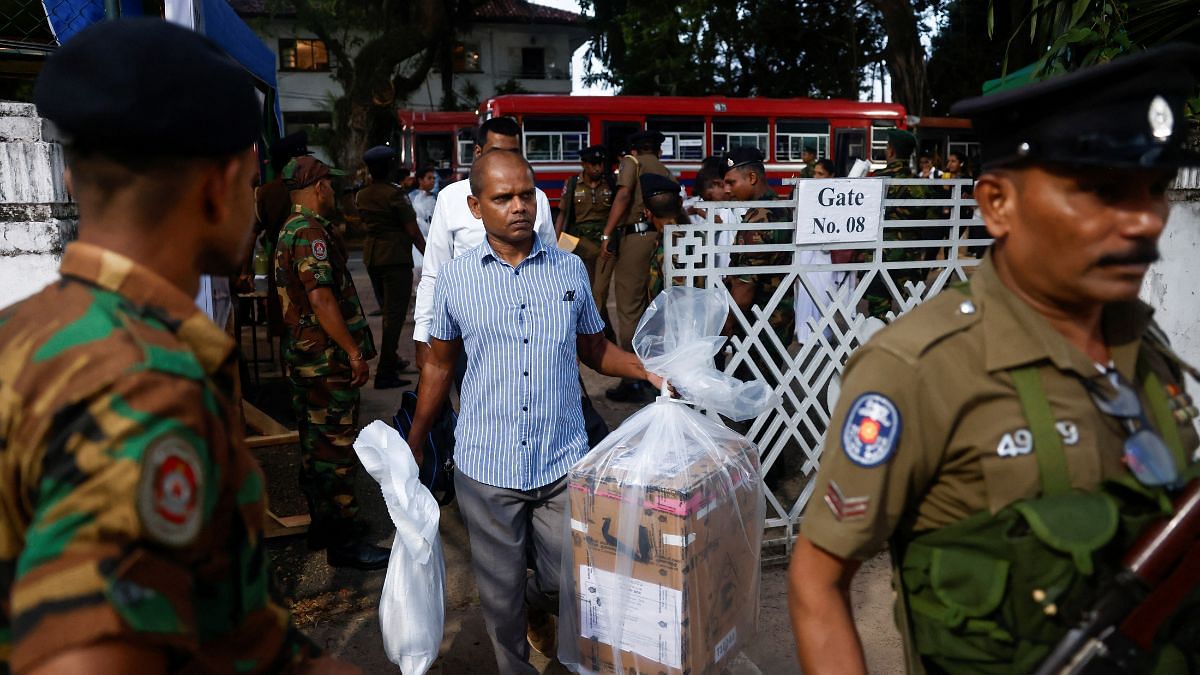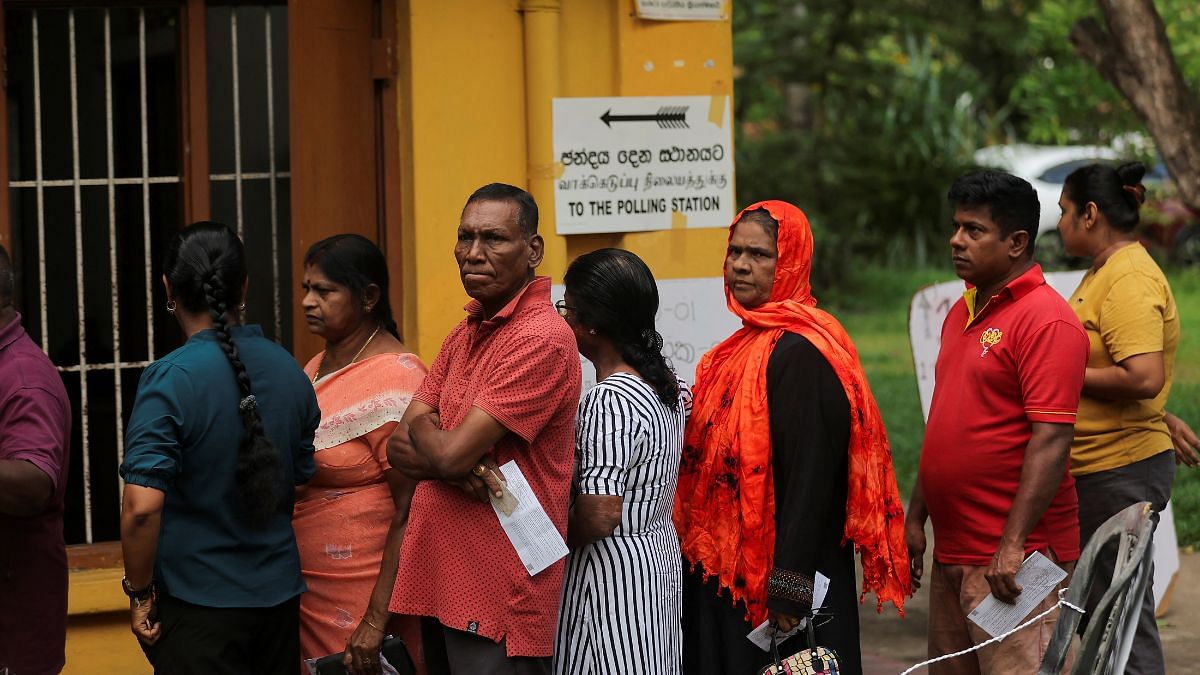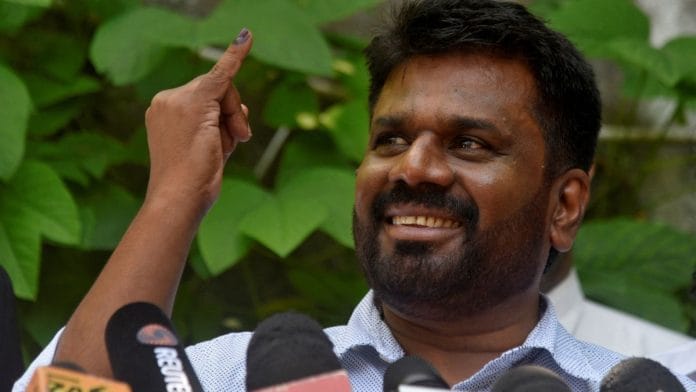Colombo: Sri Lanka woke up Sunday to the news that they might have a leftist leader for the first time in history—Anura Kumara Dissanayake, the leader of the Marxist JVP.
The island nation voted for their new president Saturday in a peaceful and calm election — even as a surprise curfew was imposed from 10pm Saturday to 12 noon Sunday. Voters had 38 presidential candidates to choose from, but the top three candidates were incumbent president Ranil Wickremesinghe, leader of the opposition from the SJB Sajith Premadasa, and Dissanayake.
However, it became clear by 1 am Sunday that Dissanayake was in the lead: the counting of postal ballots from 21 out of 22 districts clearly projected him as the winner. All government employees had the option to vote by postal ballots.
Dissanayake’s lead, though, has decreased since early Sunday morning, and a second round of counting of votes is taking place even though he is still expected to come out on top based on his lead margins.

This is the first time in Sri Lankan history that a second round of counting is taking place. Everyone except Dissanayake and Premadasa has been eliminated from the running, including Wickremesinghe.
The counting continued overnight, but it looked like the political establishment had already conceded defeat to Dissanayake. Members of the government were exchanging phone calls commiserating the situation, expressing shock, and discussing their plan of action for the next day, according to those in the know.
As dawn broke, the prospect of a leftist president taking over began to sink in.
By 7am Sunday, political leaders across the spectrum began congratulating Dissanayake—including members of Premadasa’s SJB and cabinet ministers in Wickremesinghe’s government.
“I extend my sincere congratulations to Mr. Dissanayake and his team,” wrote Foreign Minister Ali Sabry on X. “Leading a country is no easy task, and I genuinely hope that their leadership brings Sri Lanka the peace, prosperity, and stability it so deeply deserves… I hope Mr. Dissanayake and his team learn from these past mistakes and lead with a commitment to transparency, integrity, and the long-term good of the country.”
Also read: Calm streets, excitement in air as voting ends in tight Sri Lanka presidential race
An overnight count
Dissanayake is preparing to be sworn in as President on Monday, according to sources in the JVP.
Sri Lankan media reports that the swearing in will take place only after the National Election Commission officially declares the results, and that the time of taking oaths will be at an “auspicious time for the nation.”
Sources in the JVP also confirmed to ThePrint that senior leadership had a closed-door meeting Sunday morning at 10:30 am to discuss the transition of power and whether or not dissolving parliament was a feasible option.
Vijitha Herath, an MP from Dissanayake’s coalition NPP, told reporters Sunday afternoon that Dissanayake had a clear lead of 1.3 million votes in the first round of counting.
The new president can only take office with a clear majority of over 50 percent of the vote. Since Dissanayake didn’t reach that number by the time all votes are counted, a second round of counting is taking place. However, given the large margins, it looks like he will maintain a lead even in the second round, according to analysts. Postal ballots gave him a sweep of nearly 60 percent through Saturday night.
Dissanayake had reiterated his resolve to dissolve Parliament as campaigning ended on 18 September, highlighting the urgent need to reshape the country’s political landscape with parliamentary elections as soon as possible. Parliamentary elections were originally scheduled for 2025. However, it is still unclear whether he will do that, or form an interim cabinet instead.
A ‘system change’ for Sri Lanka
Dissanayake, known as AKD, ran on an anti-corruption platform and is seen to represent the “system change” that the 2022 popular uprising demanded. He managed to capture most of the Sinhala vote, riding the populist wave following the uprising. It’s a massive change in his political fortunes after he polled only around 3 percent when he ran in the 2019 presidential elections.

On the other hand, both Wickremesinghe and Premadasa are seen as representatives of the government establishment that caused the economic crisis and its subsequent political chaos—both come from political families and have held various positions of power.
Premadasa did not take up the presidency in 2022 on moral grounds after the uprising ousted former president Gotabaya Rajapaksa. Wickremesinghe, instead, took over and cobbled together a government across party lines, even though he didn’t have the popular mandate. His campaign ran on the promise of continued economic stability, which his government achieved after negotiating a bailout package with the International Monetary Fund.
Compared to his competition, Sinhala nationalist and leftist Dissanayake represents a completely new political direction for Sri Lanka.
During his last rally on 18 September, Dissanayake declared that 21 September—the day Sri Lanka voted—would be the end of a 76-year political curse on the country.
“The people have endured massive suffering. Over the past 76 years, these rulers have committed wrongs that cannot be taken lightly. However, those rulers have become a curse,” he said, adding that it was time to look to a new future for Sri Lanka.






